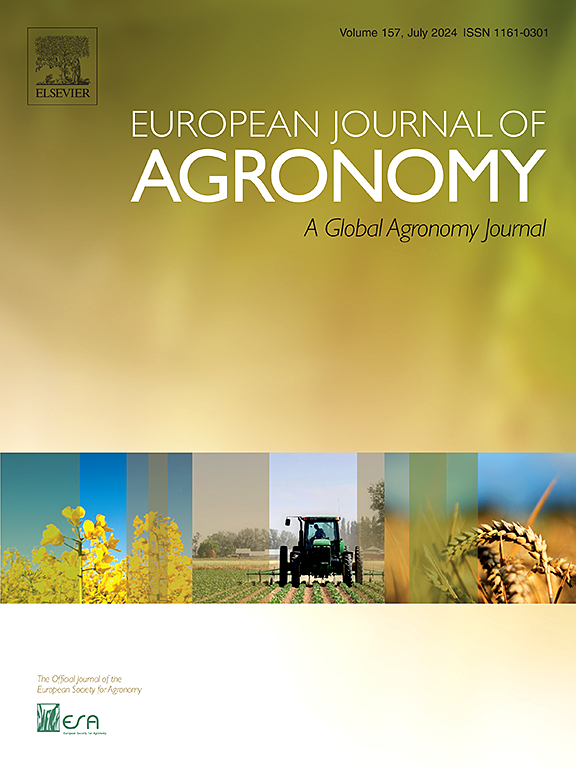热胁迫对玉米氮素代谢的持续破坏,限制了玉米幼穗生长和产量。
IF 5.5
1区 农林科学
Q1 AGRONOMY
引用次数: 0
摘要
全球变暖引发的极端高温事件对玉米生产构成了重大威胁。氮(N)等植物养分为提高热胁迫耐受性和维持玉米产量提供了机会。然而,目前仍不清楚在热胁迫下玉米生长如何对氮和碳(C)代谢做出反应。在本研究中,耐热杂交种Zhengdan958(ZD)和热敏感杂交种Xianyu335(XY)分别在十二叶期(V12)和抽穗期(VT)受到连续七天的热胁迫(昼夜温差:38 ℃/30 ℃)。在自然温度条件下生长的玉米作为对照。与对照相比,热胁迫强烈抑制了玉米器官的生长。尤其是幼穗干重受到的损害比其他器官更为严重。在加热过程中,幼穗对 15N 的吸收、13C 的同化及其再分配明显减少。热胁迫解除后,由于叶片氮同化能力(C/Nleaf)、氮利用效率(NUtE)和碳积累持续下降,植株生长速度没有恢复。在加热过程中,蔗糖合成酶、硝酸还原酶、谷氨酸脱氢酶、谷氨酰胺氧谷氨酸氨基转移酶等与氮和碳代谢相关的酶的活性分别平均降低了 24.5%、23.2%、28.9% 和 27.8%,并且在热胁迫解除后很长一段时间内都未能有效恢复。此外,在热胁迫下,浙丹958在V12和VT期的非结构碳水化合物(NSC)总积累比对照植株分别减少了26.5%和33.0%,而仙玉335则分别减少了34.4%和42.5%。同时,热胁迫强烈抑制了 NSC 在果仁中的分布和再动员。热胁迫的负面影响最终导致玉米产量下降。与对照相比,热胁迫下的浙稻958在V12期和VT期的籽粒产量分别减少了54.6%和71.9%,而先玉335则分别减少了74.4%和83.44%。结果表明,热胁迫下氮素分布减少和氮素代谢酶活性持续受到破坏分别是抑制幼穗生长和降低籽粒产量的主要途径。相比之下,耐热杂交种在热胁迫下能促进幼穗生长,并通过改善氮代谢减少产量损失。本文章由计算机程序翻译,如有差异,请以英文原文为准。
The continuous damage to nitrogen metabolism caused by heat stress limited the young ear growth and yield of maize (Zea mays L.)
Extreme high-temperature events triggered by global warming have posed a significant threat to maize production. Plant nutrients such as nitrogen (N) offer an opportunity in increasing heat stress tolerance and sustaining maize productivity. However, it remains unclear how maize growth responds to N and carbon (C) metabolism under heat stress. In this study, the heat-tolerant hybrid Zhengdan958 (ZD) and the heat-sensitive hybrid Xianyu335 (XY) were subjected to heat stress (day/night: 38 °C/30 °C) for seven consecutive days at the twelfth-leaf stage (V12) and the tassel stage (VT) respectively. The maize grown under natural temperature conditions serving as the control. Heat stress strongly inhibited maize organ growth compared with the control. Especially, the dry weight of young ears suffered more severe damage than that of other organs. During the heating process, the 15N uptake, 13C assimilation, and their redistribution to young ear was significantly reduced. After heat stress relief, plant growth rate was not recovered due to continuous decline in C assimilation capacity of leaf N (C/Nleaf), N utilization efficiency (NUtE) and C accumulation. The activities of enzymes related to N and C metabolism, such as sucrose synthase, nitrate reductase, glutamate dehydrogenase, glutamine oxoglutarate aminotransferase reduced averagely by 24.5 %, 23.2 %, 28.9 %, and 27.8 % under heating process, respectively, and failed to be effectively restored in a long time after heat stress relief. In addition, the total accumulation of non-structural carbohydrates (NSC) in Zhendan958 under heat stress at the V12 and VT decreased by 26.5 % and 33.0 % compared with control plants, while that of Xianyu335 decreased by 34.4 % and 42.5 % respectively. Meanwhile, heat stress strongly inhibited the distribution and remobilization of NSC to kernels. The negative impacts induced by heat stress ultimately led to a decrease in maize yield. Compared with the control, the kernel yield of Zhendan958 under heat stress at the V12 and VT stages reduced by 54.6 % and 71.9 %, while those of Xianyu335 reduced by 74.4 % and 83.44 % respectively. The results indicated that the reduction of N distribution and the continuous damage to N metabolism enzyme activities under heat stress were the main pathways inhibiting the growth of young ears and reducing kernel yield, respectively. In contrast, heat-tolerant hybrid promote the growth of young ears under heat stress and reduce yield losses by improving N metabolism.
求助全文
通过发布文献求助,成功后即可免费获取论文全文。
去求助
来源期刊

European Journal of Agronomy
农林科学-农艺学
CiteScore
8.30
自引率
7.70%
发文量
187
审稿时长
4.5 months
期刊介绍:
The European Journal of Agronomy, the official journal of the European Society for Agronomy, publishes original research papers reporting experimental and theoretical contributions to field-based agronomy and crop science. The journal will consider research at the field level for agricultural, horticultural and tree crops, that uses comprehensive and explanatory approaches. The EJA covers the following topics:
crop physiology
crop production and management including irrigation, fertilization and soil management
agroclimatology and modelling
plant-soil relationships
crop quality and post-harvest physiology
farming and cropping systems
agroecosystems and the environment
crop-weed interactions and management
organic farming
horticultural crops
papers from the European Society for Agronomy bi-annual meetings
In determining the suitability of submitted articles for publication, particular scrutiny is placed on the degree of novelty and significance of the research and the extent to which it adds to existing knowledge in agronomy.
 求助内容:
求助内容: 应助结果提醒方式:
应助结果提醒方式:


